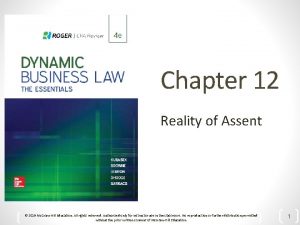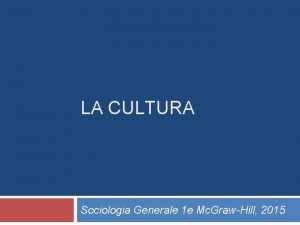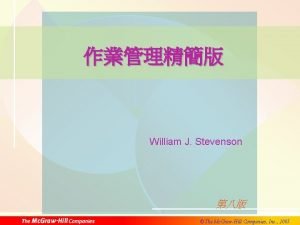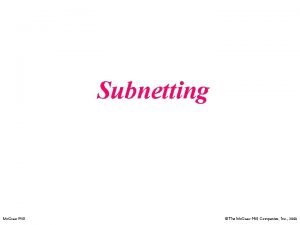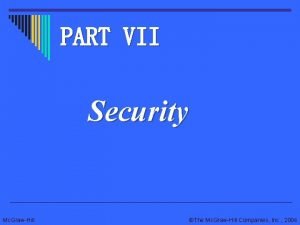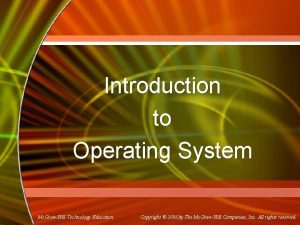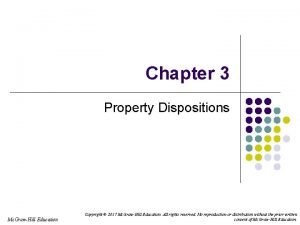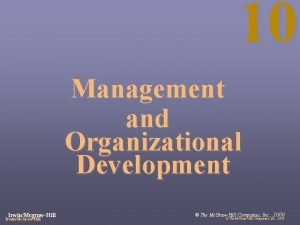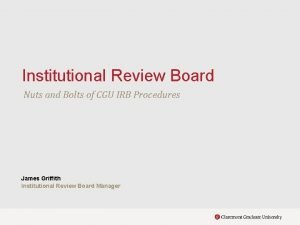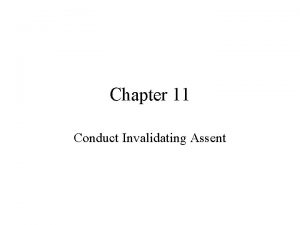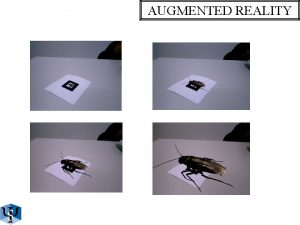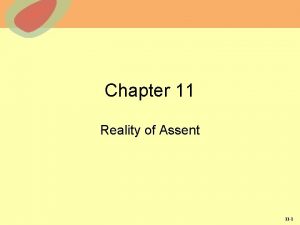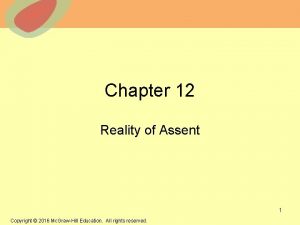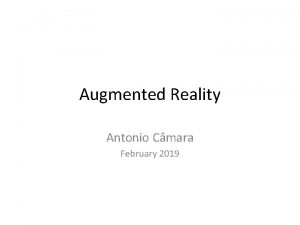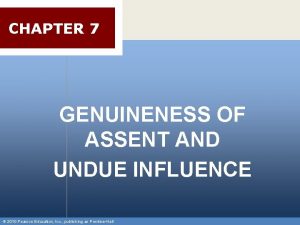Chapter 12 Reality of Assent 2019 Mc GrawHill











- Slides: 11

Chapter 12 Reality of Assent © 2019 Mc. Graw-Hill Education. All rights reserved. Authorized only for instructor use in the classroom. No reproduction or further distribution permitted without the prior written consent of Mc. Graw-Hill Education. 1

Legal Assent • Definition: Voluntary, willing promise to transact the law will require contracting parties to obey. • Without assent, contract may be avoided/rescinded. • Cancellation of contract due to lack of assent means party with power of avoidance can require return of consideration given to other party; similarly, party with rescission right must return consideration received from other party. • Major “obstacles” to legal assent: Mistake, misrepresentation, undue influence, and duress. © 2019 Mc. Graw-Hill Education. 2

Mistake • Definition: Misunderstandings regarding material facts of contract at time agreement made. • Unilateral Mistake: Mistake made by one contracting party; generally, contract still binding. • Mutual (Bilateral) Mistake: Mistake made by both parties; if mutual mistake of material (significant) fact, either party can rescind contract. © 2019 Mc. Graw-Hill Education. 3

For a mutual mistake to interfere with legal consent, it must involve: • A basic assumption about the subject matter of the contract; • A material effect on the agreement; and, • An adverse effect on a party who did not agree to bear the risk of mistake at the time of the agreement. © 2019 Mc. Graw-Hill Education. 4

Innocent Misrepresentation • Definition: False statement about material fact that person who made statement believed true. • Person who made innocent misrepresentation lacked “scienter”; i. e. , had no knowledge of falsity of claim. • Party misled by innocent misrepresentation can rescind contract, but cannot sue for damages. © 2019 Mc. Graw-Hill Education. 5

Negligent or Fraudulent Misrepresentation Negligent Misrepresentation (Definition): Negligent, untruthful assertion of material fact by contracting party; aggrieved party can rescind contract, and sue for damages. • Contrast with “innocent misrepresentation”, when party making false assertion believes it to be true, and is not negligent in making false assertion; although innocent misrepresentation permits misled party to rescind contract, he/she cannot sue for damages. Fraudulent Misrepresentation (Definition): Intentional, untruthful assertion of material fact by contracting party; aggrieved party can rescind contract, and sue for damages. Courts permit contract rescission for negligent or fraudulent misrepresentation, assuming: • False assertion. • Negligence resulting in deception, or intent to deceive. • Justifiable reliance on false assertion by innocent party. © 2019 Mc. Graw-Hill Education. 6

Undue Influence Definition: Persuasive efforts of dominant party, who uses special relationship to unduly persuade the other party. Any relationship involving one party’s unusual degree of trust in another can give rise to undue influence. • Examples include attorney-client relationship, and doctorpatient relationship. © 2019 Mc. Graw-Hill Education. 7

Questions Affecting Determination of Undue Influence • Did dominant party “rush” the other party to consent? • Did dominant party gain unjust enrichment from the agreement? • Was non-dominant party isolated from other advisers at time of agreement? • Is contract unreasonable, in that it overwhelmingly benefits dominant party? © 2019 Mc. Graw-Hill Education. 8

Duress • Definition: Occurs when one party threatens other with wrongful act unless assent given. • Duress is not legal assent, since coercion interferes with contracting party’s free will. • For courts to rescind agreement, injured party must prove duress left no reasonable alternatives to contractual agreement. © 2019 Mc. Graw-Hill Education. 9

Situations Involving Duress • One party threatens physical harm or extortion to gain consent to contract. • One party threatens to file criminal lawsuit unless consent given to terms of contract. • One party threatens to file frivolous civil lawsuit unless consent given to terms of contract. • One party threatens the other’s economic interests (although in many jurisdictions, recovery based on economic duress/pressure rarely granted). © 2019 Mc. Graw-Hill Education. 10

Questions for Discussion • Should contracts made through Tweets be legally enforceable? • Have you ever entered into a contract (other than for the purchase of a consumer product) electronically via the internet? If so, how did the process work? Should Tweets be treated differently by the law? © 2019 Mc. Graw-Hill Education. 11
